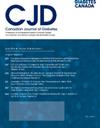妇女及其伴侣使用闭环胰岛素输送系统管理产后 1 型糖尿病的经验。
IF 2.3
4区 医学
Q3 ENDOCRINOLOGY & METABOLISM
引用次数: 0
摘要
背景:闭环胰岛素给药有可能让1型糖尿病妇女在产后从紧张的糖尿病自我护理工作中解脱出来。目的:探讨混合闭环用户及其伴侣在产后24周内的观点和意见:这项定性研究包含在一项对照研究中,研究对象是 1 型糖尿病女性患者,她们在产后 1-11 周 6 天内被随机分配使用(MiniMed™ 670G/770G)闭环胰岛素输送系统或传感器增强泵,并在产后 12-24 周内全部使用闭环胰岛素输送系统。在产后 12 周和 24 周,对 16 名研究参与者及其伴侣进行了半结构式访谈。对参与者及其伴侣的经历进行了主题分析:与以往使用非自动化胰岛素给药的经验相比,参与者对闭环使用减少低血糖有积极的看法。但也有一些人对系统使血糖水平高于他们的期望值而感到沮丧。闭环系统的使用并不影响婴儿的喂养选择。然而,婴儿喂养和护理影响了参与者的糖尿病管理。合作伙伴对闭环系统剥夺了对糖尿病自我管理非常熟练的参与者的控制权表示不确定:与以前使用的非自动化胰岛素给药相比,参与者认为闭环疗法减少了低血糖时间。然而,参与者希望更多地了解闭环算法的工作原理。这项研究为潜在用户提供了对 MiniMed™ 670G/770G 闭环产后用户体验的现实期望。本文章由计算机程序翻译,如有差异,请以英文原文为准。
Women’s and Partners’ Experiences With a Closed-loop Insulin Delivery System to Manage Type 1 Diabetes in the Postpartum Period
Objectives
Closed-loop insulin delivery has the potential to offer women with type 1 diabetes a break from intense diabetes self-care efforts postpartum. Our aim in this study was to explore the views and opinions of hybrid closed-loop users and their partners in the first 24 weeks postpartum.
Methods
This qualitative study was embedded in a controlled study of women with type 1 diabetes randomized to closed-loop insulin delivery (MiniMed 670G or 770G; Medtronic, Minneapolis, Minnesota, United States) or sensor-augmented pump use for 1 to 11 weeks 6 days postpartum, with all on closed-loop delivery from 12 to 24 weeks postpartum. Semistructured interviews were conducted with 16 study participants and their partners at 12 and 24 weeks postpartum. Thematic analyses were used to examine participants’ and partners’ experiences.
Results
Participants’ positive perceptions of closed-loop use related to reduced hypoglycemia, in contrast to previous experiences with nonautomated insulin delivery. These perceptions were balanced against frustrations with the system, allowing blood glucose levels to be higher than desired. Closed-loop use did not influence infant feeding choice, but infant feeding and care impacted participants’ diabetes management. Partners expressed uncertainty about the closed loop taking away control from participants who were highly skilled with diabetes self-management.
Conclusions
Participants reported that closed-loop insulin delivery resulted in less time spent in hypoglycemia when compared with the previously used nonautomated delivery. However, participants desired a greater understanding of the workings of the closed-loop algorithm. Our study provides potential users with realistic expectations about the experience with the MiniMed 670G or 770G closed-loop system in the postpartum period.
求助全文
通过发布文献求助,成功后即可免费获取论文全文。
去求助
来源期刊

Canadian Journal of Diabetes
ENDOCRINOLOGY & METABOLISM-
CiteScore
4.80
自引率
4.00%
发文量
130
审稿时长
54 days
期刊介绍:
The Canadian Journal of Diabetes is Canada''s only diabetes-oriented, peer-reviewed, interdisciplinary journal for diabetes health-care professionals.
Published bimonthly, the Canadian Journal of Diabetes contains original articles; reviews; case reports; shorter articles such as Perspectives in Practice, Practical Diabetes and Innovations in Diabetes Care; Diabetes Dilemmas and Letters to the Editor.
 求助内容:
求助内容: 应助结果提醒方式:
应助结果提醒方式:


